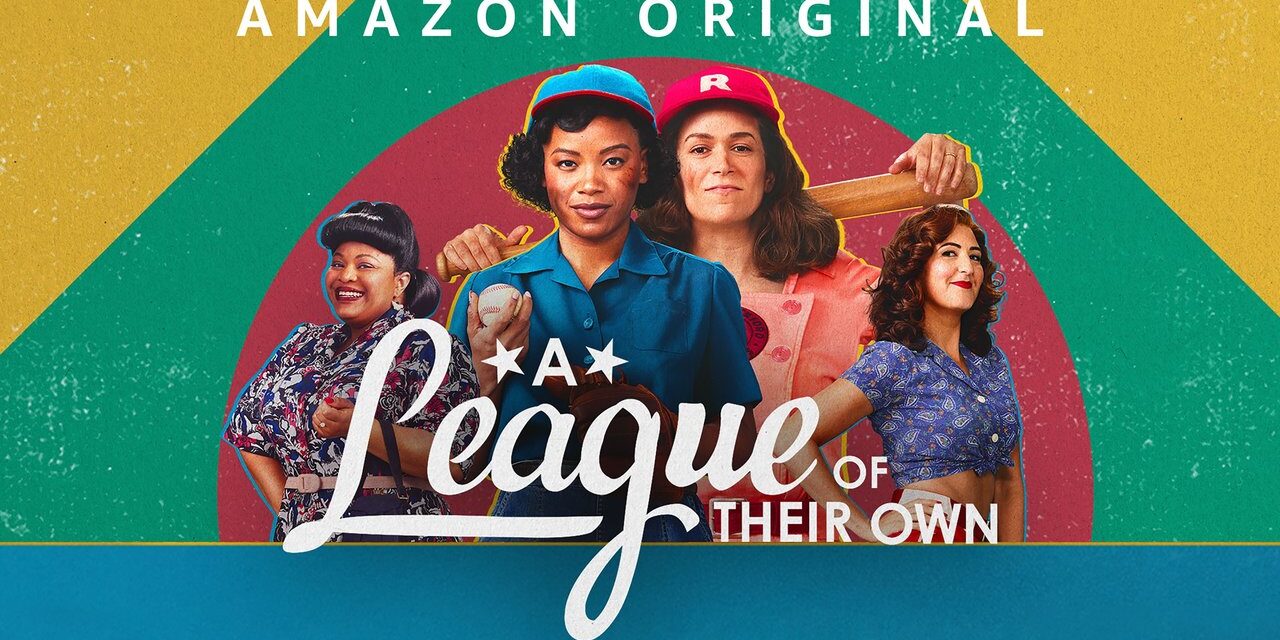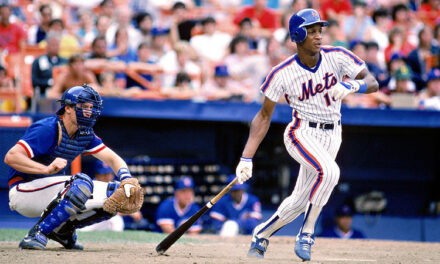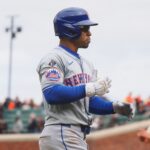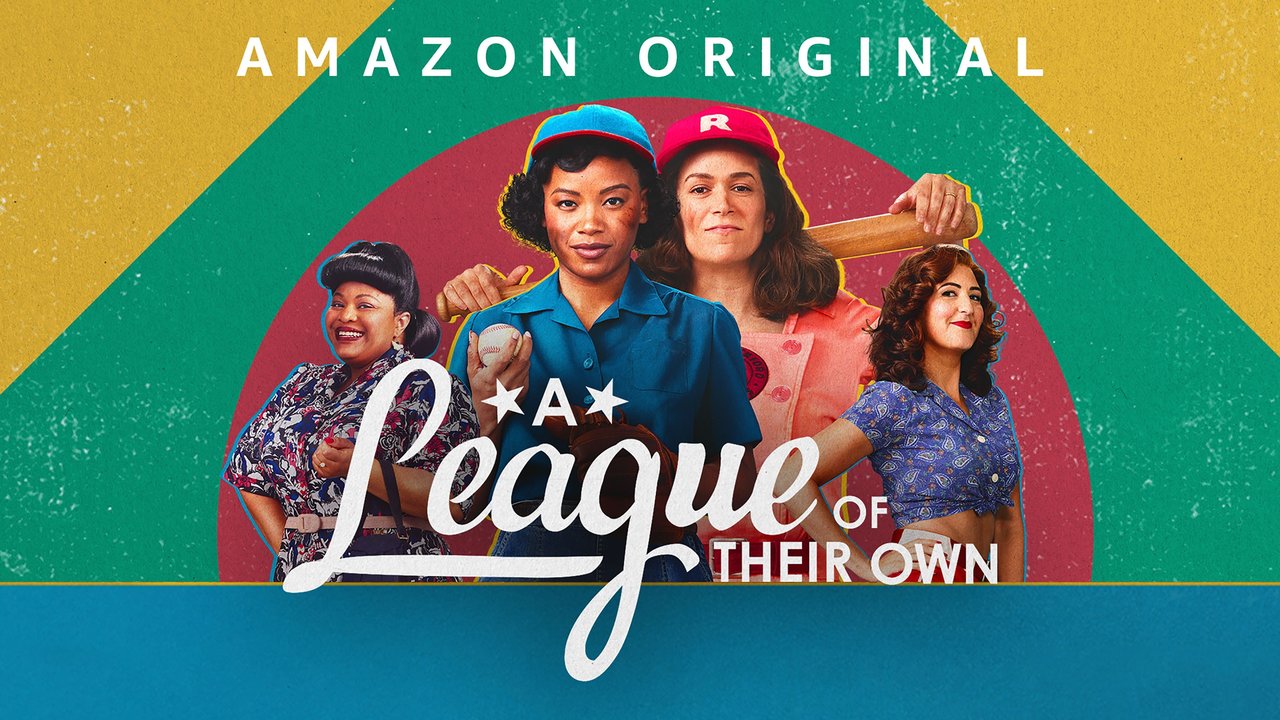
Thirty years after the release of Penny Marshall’s beloved baseball film “A League of Their Own” was released in theaters, a new adaptation has been created for Amazon Prime Video this year.
The eight-episode series, which is familiarly titled “A League of Their Own,” takes a new spin on the All-American Girls Professional Baseball League (AAGPBL) which formed in 1943 and lasted until 1954.
The series builds off of the central premise of the movie in which women across the country came together to play a game they love during the backdrop of World War II, and goes even further by examining the sexism, homophobia, and racism of the era.
Co-created by Abbi Jacobson, of “Broad City” fame, and Will Graham (“Mozart in the Jungle” executive producer), the series follows Carson Shaw (played by Jacobson), who travels to Chicago to try out for the newly formed AAGPBL in the inaugural season of 1943, while her husband is away at war.
Once Shaw makes the Rockford Peaches, one of the four original teams in the AAGPBL, she discovers more about herself and what truly makes her happy. The series also follows Max Chapman, portrayed by Chanté Adams, who has a gifted right arm but is turned away from playing on the AAGPBL due to the color of her skin.
The series fluctuates between the Rockford Peaches’ season and the path that Chapman takes to fulfill her dream of pitching professionally. The show does an excellent job of keeping the DNA of what made the original film so revered, yet tackles serious themes and delves deeper into the era, exploring sexuality and racial prejudice.
Graham, who approached Jacobson several years ago about rebooting the iconic film, grew up loving Marshall’s movie and playing the game himself, though, felt out of place as if he wasn’t supposed to be on the field due to his sexuality. The series puts the lives of queer people front and center and highlights how so many of the players in the AAGPBL had to hide their sexuality in plain sight to keep their roster spots and protect themselves and their loved ones.
“A League of Their Own” on Prime Video combines a heavy dose of strong comedic writing with dramatic undertones and situations that keeps the spirit of the 1992 film while bringing a fresh and more complete look of the time period.
I had the pleasure of speaking with Graham in late August, where he discussed the process of creating the show, co-creating the project with Jacobson, and why the time was right to bring these stories to light.
MMO: How did the idea of rebooting “A League of Their Own” for Prime Video come about?
Graham: I loved the movie and I was also a queer kid playing Little League baseball for about seven years, and crying through most of it. I think it was kind of because I felt like I wasn’t supposed to be on the field, and I think the movie kind of spoke to that subtext so I watched it a lot.
I’m really interested in old documents and letters, so a couple of years ago I was reading some of those and I came across a letter from one player to a lover that just sparked my imagination and made me wonder what the real story was underneath the movie.
What we tried to do was take that wonderful tone that Penny Marshall and the cast established, which is that they are all flawed characters; they’re sort of unpretentious and funny but it was really emotional. We tried to tell a much broader story that’s really about this generation of women who wanted to play baseball.
MMO: What made you think of Abbi Jacobson to co-create the project with you?
Graham: Why wouldn’t I think of Abbi? [Laughs.] Honestly, at that point, it was so early in the process.
First, I approached Sony and said, ‘Here’s roughly what I want to do with it, and here’s the research that I have. I think it’s time that we tell the real stories.’ I expected them to say no, and instead, they said yes, which was incredibly exciting and pretty scary.
At that time, Abbi and I knew each other a little bit; we had a close mutual friend. I had dinner with her and started talking about it and I just saw the reactions she had. I thought, Maybe she’d want to do this with me.
I love “Broad City” and Abbi’s combination of really absurd comedy and emotional vulnerability. I thought that it spoke both to the movie and also what we wanted to do in the show.
Honestly, at that point, there weren’t characters and she was filming “Broad City,” so we really didn’t know that she would be in it.
MMO: With the 1992 film being so beloved and revered to this day, did you have any trepidations about rebooting “A League of Their Own”?
Graham: Yes. We never would have wanted to do a reboot of the movie as such. If you watch the show, there’s no Dottie, there’s no Kit. If there wasn’t a really interesting set of stories underneath the movie, the real historical stories that got our attention, I don’t think we would have just approached rebooting the movie as the movie.
I think in this case it’s really more of a reimagining of the story and taking the tone of the film and going in some new directions with it. It’s now 2022 and we can tell a different kind of story.
When Abbi and I spoke to Penny Marshall, we talked about the moment where Geena Davis throws the ball and there’s a Black woman who throws it back, and she said that was her nod to them because she knew she couldn’t do their story back then.
MMO: You mentioned meeting with Penny Marshall before production. How important was it to get her blessing on this project, and can you share some details of what you and Abbi spoke to her about?
Graham: It was really important to both of us personally to get her blessing because we wanted to do something really specific and something really different. We’re both artists and we wouldn’t want someone taking something of ours without speaking to us and doing something totally new with it. I think it just sort of felt wrong.
I don’t know what would have happened if Penny hadn’t been as supportive as she was. She told us that the original cut of her movie was four and a half hours long and that there was so much they didn’t get to do that they wanted to. She told us that those stories changed her life and that it would change ours too, and she was exactly right.
It’s really been a life-changing experience getting to know these women and being submerged in these stories.
MMO: What types of research did you, Abbi, and the rest of the crew do to learn about the AAGPBL, the time period, etc.?
Graham: This wasn’t a project where we sort of had the idea and then did the research, it’s actually one that started with research.
We looked into the story of the AAGPBL and also the stories of women like Toni Stone, Connie Morgan, and Mamie Johnson, who weren’t allowed to play in the AAGPBL because of the color of the skin who went on to play in the Negro Leagues, which is an enormous baseball story that I think people are starting to become pretty aware of. They still don’t have the notoriety that they should.
No character in the show is like one person in real life. Like the movie, they’re all kinds of composites. What we really tried to do was make sure that every story we were telling in the show was authentic. Some of them were things we read in books, some of them were anecdotes that were told to us by Maybelle Blair, and some of the other players that helped us on the project. The hardest part of that search was looking into the queer community and what that was like.
MMO: What was the casting process like? Were there specific traits and attributes you all were looking for to fill the various roles?
Graham: With every person we cast, we wanted to look for their ability to do some stuff that was more comedic, and then stuff that was emotional. The tone of the show is in the intersection of those two things.
We did a lot of improve and we sort of played around with people in casting, checked out their baseball skills, and had them send us tapes of them playing ball so we could see where their starting place would be.
And then I think the last thing was incredible specificity. We really wanted the feeling of you absolutely believing each one of these characters has their own life and own set of emotions, even though we’re telling their story at some points in the season and not at others. We cast people that felt really specific to us and we worked really hard with them to personalize the characters.
MMO: I had the chance to speak with Justine Siegal when I wrote my 30th anniversary retrospective on Penny Marshall’s film. Siegal told me she was working as a baseball consultant on the show. Can you speak about Siegal’s involvement and the overall baseball training?
Graham: Justine was involved with every part of the show, from the writing to production and then post-production. She was so wonderful, and not only does she have an incredible depth of knowledge about sports psychology and baseball, but she also lived a lot of these stories, and she was able to bring that into it through her personal frame of reference.
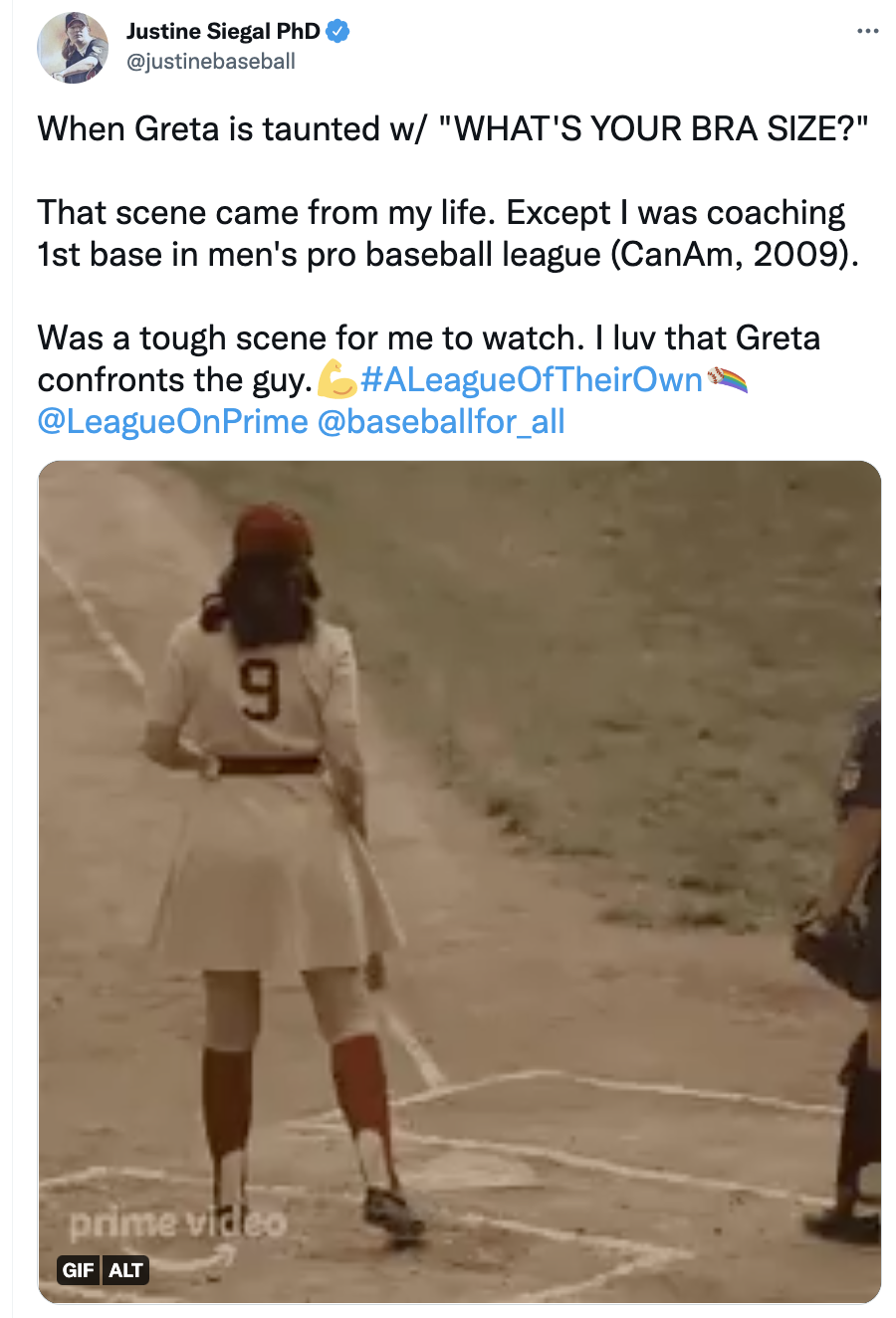
The baseball training was pretty intense! We did, I think, three weeks before the pilot and then a couple of months before we started shooting the series. We did drills and fundamentals so that everyone would kind of know what they were doing with the plays.
I also think it was an incredible bonding opportunity for the cast. It’s rare that you get to spend that much time together before you start shooting and they were already operating like a team. In some cases, we had to remind them that in certain parts of the story they just met yesterday. [Laughs.]
MMO: When I spoke with several of the actors from the 1992 film, they spoke about how Marshall was specific of casting women who could play baseball and/or were trainable. How was the casting for the show in regards to the amount of baseball/softball background that the actors had?
Graham: Everyone came in with a basic familiarity. I think there was only one or two people in the whole cast who hadn’t played in one way or another, even if it was on their high school baseball or softball team. People came in at different places and different people also had to do, Chanté [Adams] for example, who plays Max, had to do something really different in the show than D’Arcy [Carden].
We tried to really focus on the skills that each person needed with the overall goal of being able to give credit to the ladies of the AAGPBL and the other women who were playing ball at the time because they were some of the most incredible athletes of their time.
MMO: Rosie O’Donnell, who was in the ’92 film, guest stars in the sixth episode in which you wrote and directed. How did her guest appearance come about, and what was it like having her involved?
Graham: It was really surreal and I think we were all pretty nervous. I was nervous!
The way that came about was Abbi and Rosie knew each other from before. Rosie came into the writers’ room of the show, which I think made us nervous because it was one of those moments where all of the writers were like, oh, this is real!
In the writers’ room, we kind of pitched the story in-season to Rosie. We pitched the idea of the gay bar as the place that they go and Rosie said, “Well, here’s something that I can do.” She sort of pitched us the idea very roughly for the role she ended up playing in the show. So, like a lot of things in the show, it was a real collaboration. But it actually started with her.
Originally, Abbi and I were like, maybe in future seasons we’ll do stuff with the cast of the movie; we wanted the show to kind of stand on its own at first. But this just felt right. She (O’Donnell) couldn’t play a queer person in the original movie, even though, as she has now said, she felt like the character (Doris) was gay.
It was nice that she got an opportunity to do this with us. It was such an honor to get to work with her and such a moment. There were a lot of moments making this show where you kind of pinched yourself and you couldn’t believe that you were getting to do this, and that was definitely one of them.
MMO: Did you get to speak with any of the other members of the original cast?
Graham: We’ve had great conversations with Geena Davis, who’s been incredibly supportive of the show. We had a great conversation with Tracy Reiner and Megan Cavanagh, who played Marla Hooch and has become a great friend of ours. She’s kind of walked the walk ever since the movie in terms of supporting women in baseball, and she kind of brought us into the circle of how she does that.
We talked to a good number of them, and people have been incredibly, incredibly supportive, and really excited about what the show is doing. We are standing on their shoulders and Penny’s shoulders in getting to make this at all, so we’re so grateful and are looking forward to doing more with them in future seasons.
MMO: Throughout the season, I noticed that there are several nods to the original film (e.g., Carson running for the train; a barehanded catch scene; singing the AAGPBL Victory Song; and having the line, “There’s no crying in baseball.”). Was it important to have some easter eggs included in the show?
Graham: That’s another thing that evolved organically as we were doing it. I think the intent of those comes from a really genuine place which is we wanted people watching the show to feel the love and respect that we have for the movie, and at the same time, making it clear that the show is doing something a little bit different.
Those moments like the barehanded catch, the running for train, I think they all hopefully feel like you can feel the DNA of the movie, but you’re feeling it in a different way. It’s almost like a little love letter to the movie, and that was the intent of them.
There were not a lot of adaptions that we talked about using as a model because again, we were trying to do something different. I really admired what Noah Hawley did with “Fargo,” which was similar in that sense; you could feel the original in some places, but you could tell he was doing something kind of different.
MMO: We’ve talked about how this show deals far more with sexism, homophobia, and racism than the film did. Can you speak on some of these tough issues presented in the show?
Graham: There are all different kinds of characters in the show and hopefully the show is for everyone, but a big part tells the story of the queer community inside of the league and outside of it in Rockford, Illinois. I think with that and the story of women of color like Mamie Johnson, who wasn’t allowed to play in the AAGPBL and went on to play in the Negro Leagues, we really wanted to tell the stories through the lens of joy and not let the obstacles become the story, if that makes sense, or the trauma become the story.
The inner story is about people trying to realize their dreams and become the people that they want to become, and fall in love with the people that they want to fall in love with. Along the way, they have to deal with some obstacles and some of them are based in racism and sexism.
The characters in the show didn’t let their stories become about those things because the real people whose stories were inspired by didn’t let themselves be stopped by hatred or by people telling them that they couldn’t. We tried to make the show with that same spirit.
MMO: Was there a scene that was the most challenging to film?
Graham: I think all of the baseball [scenes] were incredibly challenging to shoot but also incredibly rewarding. It’s intricate and complicated, a lot of different angles, all of the stuff that can make things hard to shoot.
I think in a different way the scenes in the gay bar and in the party at Bertie’s house, those are scenes where we were very conscious that we were depicting something that hadn’t really been seen on screen before in this time period. We really tried to do that with a lot of care and a lot of layers.
MMO: I read recently that you and the writers are already working on a season two, is that correct?
Graham: Yeah, that’s right. We’ve been working on the stories for the past couple of months. The hard thing of the show from the start hasn’t been figuring out what we wanted to do, it’s been so much in the stories from the time period that in season one we had to do a lot of getting people to the field and getting to know what brought them there.
I think in season two and going forward, we’re able to tell the story of them dealing with problems that are more about getting the thing that you want, because as we all know from our own lives, that’s not the end of the story. Once you have a team or once people are paying attention, things don’t necessarily become easier.
In bigger terms, the AAGPBL lasted until 1954, which a lot of people don’t know and there really is a much bigger generational story here that we’re trying to tell with the show.
MMO: That’s right. And more teams were added to the AAGPBL, and of course, you can keep expanding on the stories and characters that have already been created in the show.
Graham: Yeah! Keep expanding and just getting to show more sides of these characters. It’s been so amazing for us in the last few weeks to kind of see the audience fall in love with these characters and the cast. We’re excited to take them into some new situations.
MMO: For those who haven’t yet watched season one, what do you hope they takeaway after viewing it?
Graham: One of the things that we’re learning watching it is that it’s been amazing to see how different people respond to the stories in the show differently and see themselves in different parts of the show. That’s so exciting for us. In particular, hearing stories.


I heard from one young woman who watched the show with her mom and then wound up coming out to her mom, I think after episode three. I talked to one woman whose grandmother watcher the show and her grandmother called her crying because she had never been supportive of her queerness and called her to apologize.
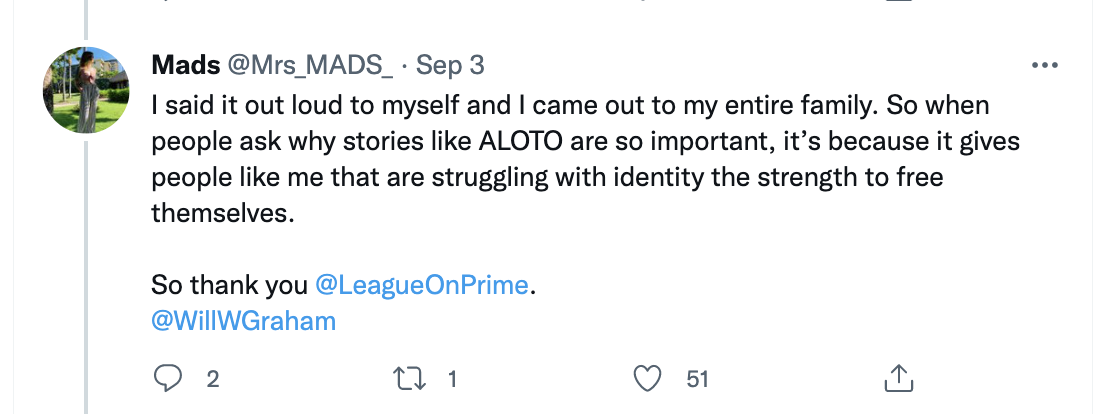
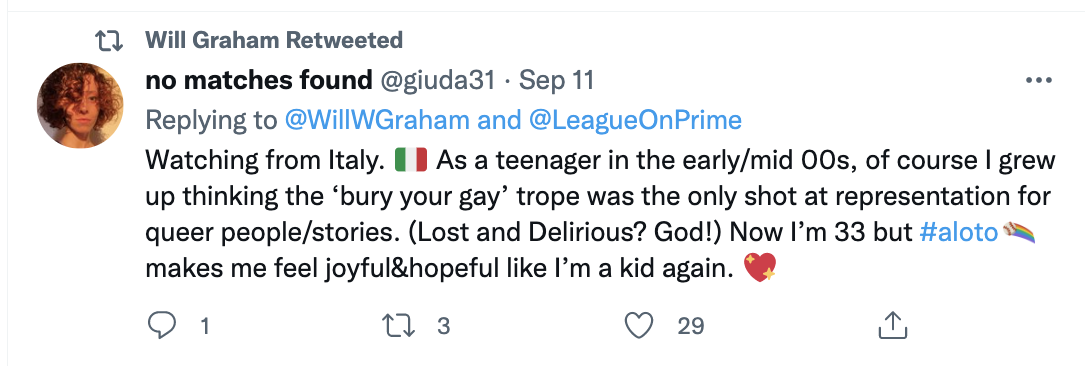
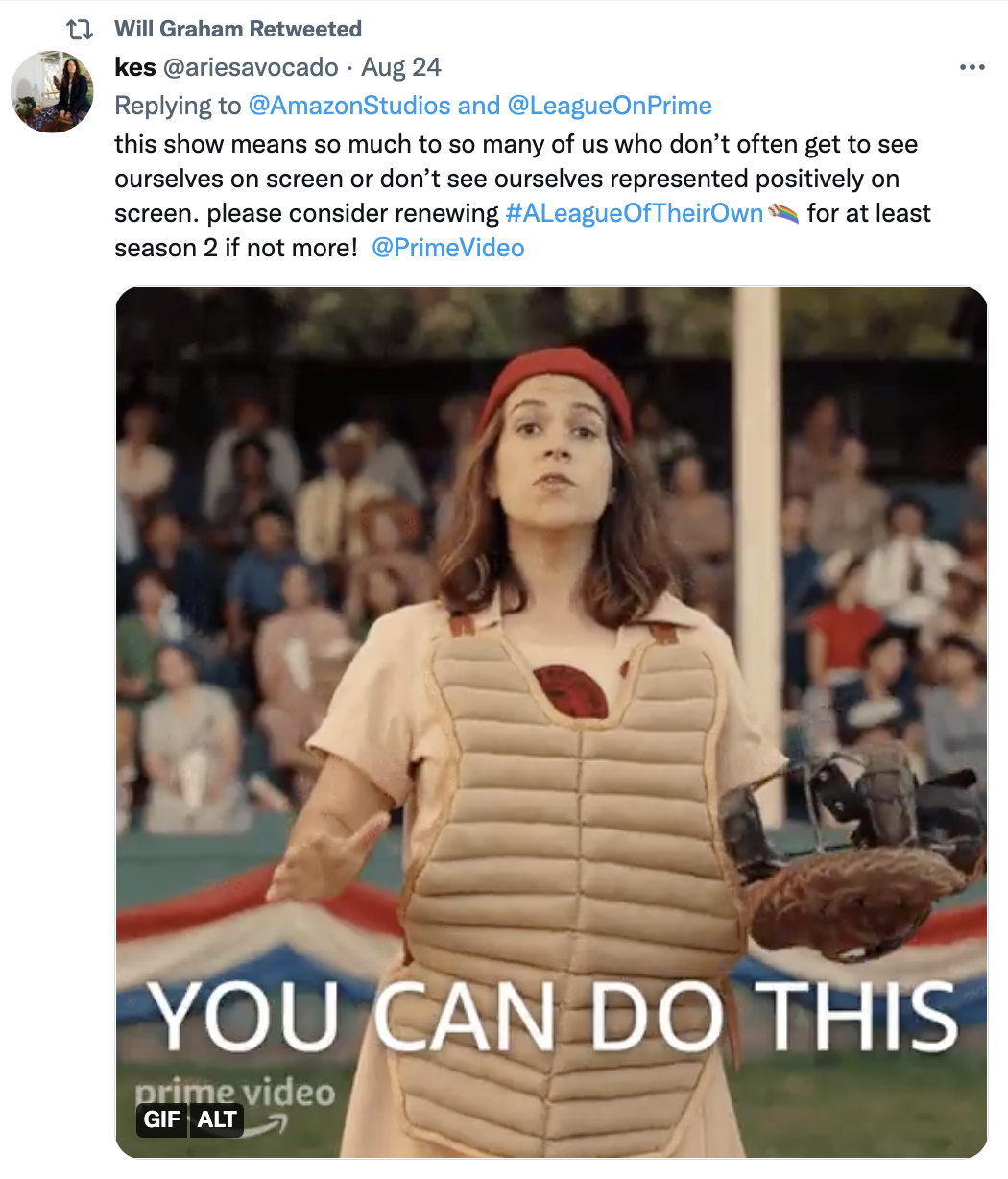
I think that our biggest hope for the show is that it builds some bridges and starts some conversations and brings people together. There are not a lot of very joyful stories of this kind getting told right now, but also this a show that is set in a dark and tumultuous time; it’s set during World War II and it’s about people finding themselves and finding their dreams of getting to play a game that they love.
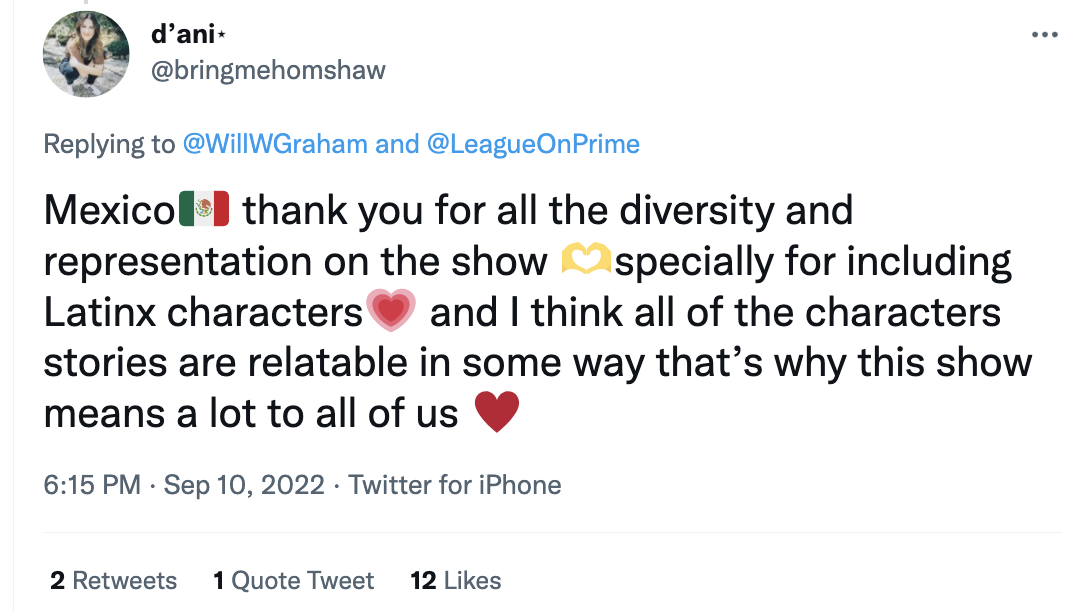
I think we’re also living in a time that sometimes feels hard and you don’t know what the world is going to be like in three or six months. I hope that people can take away that it’s okay and you should look for ways to move forward and find joy, even when the world feels hard. That’s definitely the affect that this show has had on me and if it helps other people a little bit in the same way, well, there’s nothing that would make me happier.
MMO: Thank you very much for your time, Will. And congratulations on all the success of the show so far!
Graham: Thank you so much. I really appreciate it.
Follow Will Graham on Twitter, @WillWGraham


